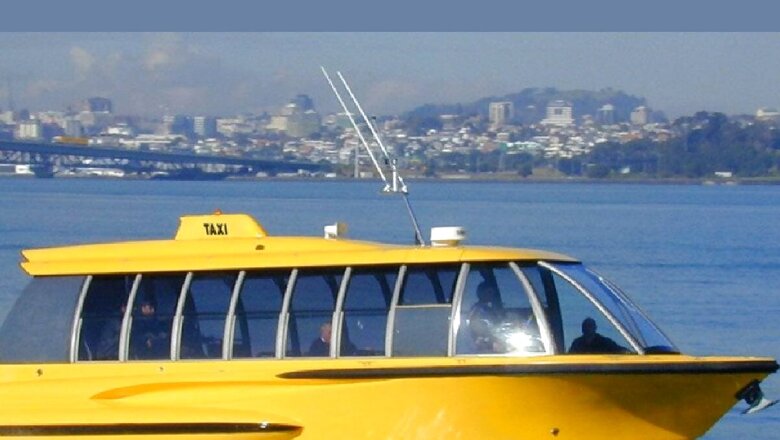
views
India is seeing newer modes of public transportation being adopted across various cities. The end goal is to have an urban mobility system that rivals those that the developed nations of the world have in place.
Earlier this week, Mumbai caught a glimpse of a remarkable change in its transportation landscape with the introduction of electric water taxis. These innovative watercraft are set to bridge the gap between the iconic Gateway of India in South Mumbai and Belapur in Navi Mumbai, offering a sustainable and efficient travel option for both residents and tourists. The water taxis are to be rolled out from December this year.
A prominent private water taxi operator, Infinity Harbour Service, has acquired four state-of-the-art electric water taxis at an initial investment cost of Rs 10 crore, with each 24-seater taxi costing Rs 2.5 crore. Infinity Harbour Service currently operates services between Belapur and the famous Elephanta Caves, as well as in the enchanting Mandwa Alibaug.
One of the most remarkable features of these electric water taxis is their energy efficiency. They can run continuously for four hours on a single charge, a stark contrast to the 140 litres of diesel consumed per hour by their traditional counterparts. This not only promises substantial cost savings but also represents a significant step towards a greener, more sustainable future for Mumbai’s water transport system. Also, these electric water taxis can speed up to 12 nautical miles and can complete the journey between Mumbai and Navi Mumbai in an hour.
Changing Landscape of Urban Transportation in India
As concerns over deteriorating air quality and rampant pollution rise, both Centre and states have started pivoting public policy to new, eco-friendly and sustainable modes of transport – at least in urban centres. While vehicles and the smoke they emit are not the only causative source of air pollution, the larger push for EV vehicles can certainly play a contributing role in reducing India’s emissions.
The Mumbai water taxi is a big step towards that goal. But it is not the only one.
• In April this year, for example, Prime Minister Narendra Modi inaugurated the Kochi Water Metro, the first of its kind in India and the first integrated water transport system of this size in Asia. It uses a fleet of 78 battery operated electric hybrid boats on 16 routes spanning 76 kilometres. It is also integrated with the Kochi Metro. There are also plans to deploy rooftop solar installations at all Water Metro terminals to make the metro service achieve energy self-sufficiency by 2024.
• In August, PM Modi had given the go-ahead for ‘PM-eBus Sewa’ with a goal of augmenting city bus operations across India. Under this initiative, 10,000 electric buses will be deployed across 169 cities. The scheme will cover cities with a population of more than 3 lakh, and priority will be given to those that do not have organised bus services. The project will be run on a public-private partnership (PPP) model.
• Just a month ago, India’s first Green Hydrogen Fuel Cell Bus was inaugurated at Delhi’s Kartavya Path by Union Minister Hardeep Singh Puri. Fuel cell technology offers advantages like high efficiency and quick refueling. The initiative highlights the potential of Green Hydrogen to foster a low-carbon, self-reliant economy. IndianOil is testing 15 buses in Delhi, Haryana, and UP, and has rolled out a state-of-the-art refueling station in Faridabad. The aim is to cover over 3 lakh kilometers in road tests to evaluate the technology’s larger viability.
• In 2024, India will have its own hydrogen train running on the tracks. Indian Railways’ much-anticipated hydrogen train is to depart from Jind in Haryana. Like hydrogen buses, hydrogen trains basically run on hydrogen fuel cells that combine oxygen and hydrogen to create electricity. Since hydrogen is a sustainable fuel, these trains will be more environmentally beneficial as compared to diesel or electricity powered trains.
As part of its COP-26 targets, India has committed to cut its total carbon emissions by one billion tonnes by 2030. PM Modi has been an ardent advocate of better transportation systems, as is evident from his push for more metros, high speed trains and airports. The launch of several innovative urban transport projects which utilise electric vehicles or hydrogen as a fuel course, points to India’s commitment towards a sustainable future.


















Comments
0 comment